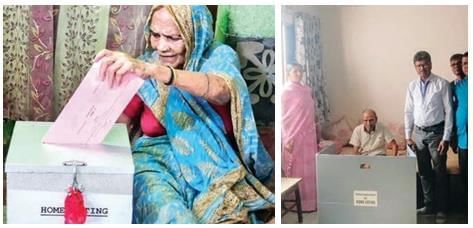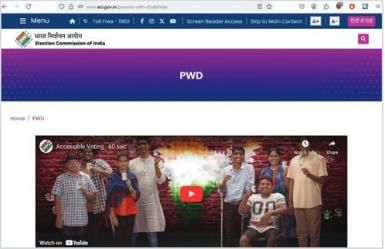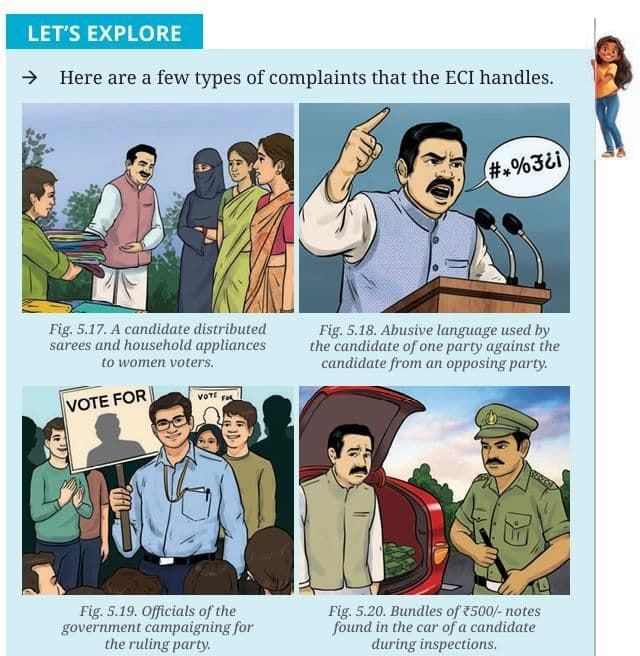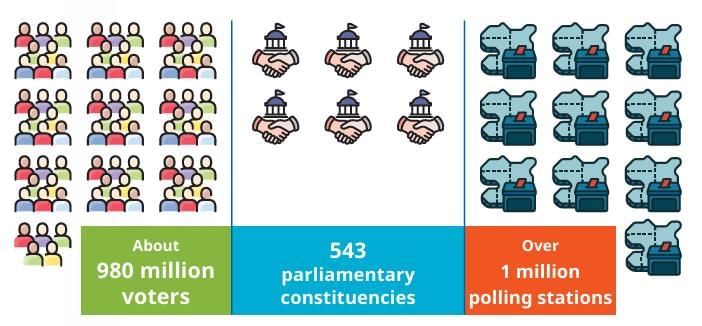Universal Franchise and India’s Electoral System NCERT Solutions | Social Science Class 8 - New NCERT PDF Download
| Table of contents |

|
| Page No. 117 |

|
| Page No. 118 |

|
| Page No. 120 |

|
| Page No. 121 |

|
| Page No. 123 |

|
| Page No. 125 |

|
| Page No. 128 |

|
| Page No. 132 |

|
| Page No. 133 |

|
| Page No. 134 |

|
| Page No. 136 |

|
| Page No. 138 |

|
Page No. 117
The Big Questions
Q1: What is the universal adult franchise?
Ans: Universal Adult Franchise is the right of all adult citizens (above 18 years of age) to vote in an election, regardless of their caste, gender, race, creed, religion, economical, educational or social status.
Q2: What is an electoral system?
Ans: An electoral system is the method and rules used for electing representatives in a democracy. It explains how people vote, how the votes are counted, and how winners are chosen. It helps make elections fair and lets people take part in choosing their leaders.
Q3: How does India’s electoral system work?
Ans: India’s electoral system works through free and fair elections where representatives are chosen by the people using secret ballots, based on the principle of Universal Adult Franchise which means every adult citizen has the right to vote. This system ensures that elections are fair and everyone’s vote is kept secret.
Page No. 118
Let’s Explore
Q1: India changed the minimum age for voting from 21 to 18 in 1988. Discuss whether this was a good move.
Ans: Lowering the voting age from 21 to 18 in 1988 was a good step towards making India’s democracy more inclusive. It allowed young people to take part in elections and express their views on matters that affect their future. This change brought India in line with many other countries and gave millions of youth the right to vote. Though some people worried about their political understanding, it helped make the youth more aware, responsible, and active in the democratic process.
Page No. 120
Let’s Explore
Q2: In 1947, our literacy rate was about 14 per cent, only about 8 per cent among women. Some argued that the right to vote should be given only to literate people. Discuss in your group why the Constitution makers may have decided on universal franchise from the time of Independence itself.
Ans: The Constitution makers may have decided on Universal Adult Franchise from the time of independence to:
- Ensure equality and fairness by giving every adult citizen, regardless of caste, gender, creed, religion, income, or education, the right to vote.
- Strengthen democracy by involving all citizens in the decision-making process.
- Break social hierarchies and promote social justice in a diverse country like India.
- Show the world that India believes in inclusive and participatory governance right from the start.
Page No. 121
Let’s Explore
Q3: Discuss in Groups
(a) What role do such measures play in a democracy?
Ans: These measures ensure that every eligible citizen, including the elderly, disabled, and those in remote areas, can participate in the electoral process. This helps uphold the principle of Universal Adult Franchise and strengthen democracy by making it inclusive.
(b) Do you know of anyone who benefited from these improved accessibility measures?
Ans: (Suggestive Answer) Yes, I know of an elderly neighbour who was able to vote from home during the 2024 general elections using the postal voting option.
(c) How might they increase voter participation in your neighbourhood?
Ans: These measures can encourage more people, especially those with physical limitations or mobility issues, to vote by making the process easier and more accessible.
(d) How can technology assist?
Ans: Technology can assist by providing braille-enabled voter cards, mobile apps to request assistance, and ensuring polling stations are equipped with tools like ramps and support for the disabled. This helps remove barriers and enables more inclusive participation.
Q4: If you have access to the internet, visit the ECI website (https:// www.eci.gov.in/persons- -with-disabilities.) Read and identify the various interventions that the ECI has taken to facilitate voting by people with disabilities.
Ans: The Election Commission of India is dedicated to making voting accessible for persons with disabilities (PwDs). PwD voters are registered under four categories: visual impairment, speech and hearing disability, locomotor disability, and others. They can register online, at service centres, or via the Saksham app.
Key initiatives to assist PwDs include:
- Mapping PwDs polling station-wise for better support
- Ensuring polling stations are on the ground floor.
- Providing PwD-friendly facilities and separate queues.
- Offering optional home voting.
- Issuing voter ID cards and slips in Braille.
- Adding Braille features to voting machines.
- Providing wheelchairs, ramps, and free pick-and-drop transport.
Page No. 123
Let's Explore
Q5: (a) About 34 per cent of eligible voters did not exercise their right to vote in the 2024 elections. Why do you think this is so?
Ans: The 34 per cent of eligible voters who did not vote may have faced voter apathy due to a lack of awareness, disinterest in politics, or the belief that their vote would not make a difference. Additionally, practical difficulties such as long distances to polling stations, health issues, or lack of proper ID may have also prevented them from voting.
(b) What are some challenges people face in exercising their rights?
Ans: Some challenges that people face in exercising their rights are:
- Physical disabilities or old age.
- Inaccessible polling stations.
- Lack of Voter ID or registration issues.
- Low awareness about voting procedures.
- Poor transportation in remote areas.
- Work or family commitments on voting day.
(c) Design and conduct a short survey among adults in your family and neighbourhood to answer these questions. Analyse the data and write a report with suggestions on how it may be possible to ensure everyone votes.
Ans: The survey showed that many adults could not vote due to transport problems, long queues, and lack of proper information about candidates. To improve participation, mobile polling booths can be set up in remote areas, and awareness drives can educate people about the importance of voting. Extending voting hours, improving transport facilities, and ensuring ramps and wheelchairs at polling stations can help more people, including the elderly and disabled, cast their votes easily.
Page No. 125
Let's Explore
Q6: What are the most important aspects of the election process in this caselet?
Ans: The most important aspects of the election process in this caselet are:
- Free and fair election without any influence or pressure.
- Every student had right to vote which shows equality.
- Secret ballot to protect voter privacy.
- Independent election officer to conduct and oversee election.
- Another teacher was called to witness the counting process which shows transparency and accountability.
- Voter awareness and participation.
Q7: Why was it important to have a secret ballot?
Ans: A secret ballot ensures that voters can make their choices freely without fear, pressure, or influence from others. It protects the privacy of the voter and helps maintain the fairness and integrity of the election.
Q8: What considerations might the students have had while exercising their choice?
Ans: While exercising their choice, the students might have considered the following:
- The candidate’s background and honesty.
- Issues that the candidates promised to resolve.
- Personal beliefs or values.
Q9: Do you think the students have any responsibility after Gurmat was elected as the class rep? If yes, what are they?
Ans: Yes, the students have a responsibility now that Gurmat has been elected as the class representative. They should cooperate with her in fulfilling the promises she made during her campaign, even if they did not vote for her. By supporting her efforts, all the students stand to benefit not just those who voted for her.
Q10: What was the role that Ms. Usha played? Why was it important?
Ans: Ms. Usha was appointed as the Election Officer for the annual class representative election. It was essential to ensure that the election process was fair, transparent, and conducted in strict accordance with the rules, without any bias.
Q11: Why was it important for Ms. Usha to organise braille ballot paper for Neha?
Ans: It was important for Ms. Usha to arrange braille ballot papers for Neha, as she was visually impaired. Without them, Neha would not have been able to cast her vote. In a democracy, every eligible individual has the right to vote. Since Neha was a student in that class and met the criteria, she was eligible. If Ms. Usha had not made the necessary arrangements, Neha would have been unfairly excluded from the voting process.
Q12: What would happen if many students in the class chose not to mark a preference?
Ans: If many students do not mark their preference, the number of valid votes will decrease, and the election results may not reflect the true choice of the majority. It would show a lack of interest or awareness among students and could discourage future candidates. Non-participation also means losing the chance to influence the outcome, which might lead to dissatisfaction with the elected representative later.
Don’t Miss Out
Q1: Imagine if a student did not want to vote for any of the candidates Ahmed, Gurmat, or Ravi. What option would they?
Ans: If a student did not want to vote for any of the candidates Ahmed, Gurmat, or Ravi they would have the option to choose NOTA (None Of The Above).
Page No. 128
Let's Explore
Q13: Identify teachers in your school or vicinity who may have performed election duty. Invite them to your class to share their experiences.
Ans: (Suggestive Answer) We invited two teachers, Mrs. Sunita Sharma and Mr. Rajesh Kumar, who served on election duty during the 2024 general elections. Mrs. Sharma shared her experience at a rural polling booth, where she learned to use EVMs and VVPATs and faced challenges reaching remote areas. Mr. Kumar worked at a city booth and spoke about helping elderly and disabled voters with ramps and Braille slips. Both said the duty was tiring but gave them pride in serving democracy. Their stories helped us understand how carefully and fairly elections are conducted in India.
Page No. 131

Q14: Why do you think these might be violations of the code of conduct?
Ans: These actions are violations of the Model Code of Conduct because:
- Sarees distributed: Giving gifts or freebies to voters is considered bribery, which is unfair and influences voters’ choices.
- Abusive language against another candidate: Using foul or disrespectful language goes against the principle of respectful campaigning and can incite hatred or violence.
- Government officials working for ruling party candidate: Government officers must remain neutral during elections. Their involvement supports unfair advantage and undermines free and fair elections.
- 500 bundles found in car: Carrying large sums of unaccounted cash during elections suggests an attempt to buy votes, which is illegal and unethical.
These practices go against the spirit of fairness, transparency, and equality that elections must follow in a democracy.
Page No. 132
Let's Explore
Q15: When is the next election in the region where you are located? Is it to the state, urban local body or panchayat?
Ans: (Suggestive Answer) In my region i.e., Delhi, the next election will be held to Municipal Corporation of Delhi in 2027. This will be an urban local body election.
Page No. 133
Don't Miss Out
Q2: The legislative assembly is called by several names in regional languages, for example, Vidhan Sabha and Niyama Sabha. What is it called in your state?
Ans: In my region, West Bengal, the legislative assembly is called the Vidhan Sabha.
Page No. 134
Let's Explore
Q16: Who are the MP and MLA / MLAs of the constituency you are located in? (A Lok Sabha constituency may have two or more assembly constituencies.)
Ans: (Students to rewrite answer after finding their local MLAs and MP.) In my area, which falls under the Gurugram Lok Sabha constituency in Haryana, our Member of Parliament (MP) is Rao Inderjit Singh from the Bharatiya Janata Party (BJP), elected in the 2024 General Elections. This constituency has nine assembly segments. Some key MLAs (2024) are Mukesh Sharma from Gurgaon, Rao Narbir Singh from Badshahpur, Bimla Chaudhary from Pataudi (SC), and Tejpal Tanwar from Sohna. A few numbers showing the scale of the 2024 Lok Sabha elections.
A few numbers showing the scale of the 2024 Lok Sabha elections.
Q17: Which party does each of them belong to?
Ans: All the representatives from the Gurugram Lok Sabha constituency belong to the Bharatiya Janata Party (BJP). This includes Rao Inderjit Singh, the MP, as well as the MLAs from Gurgaon, Badshahpur, Pataudi (SC), and Sohna assembly segments. Thus, both at the national and state levels, the constituency is represented by the BJP.
Q18: What are the concerns of the MP and MLA, respectively?
Ans: The concerns of an MP and MLAs differ in scope. An MP focuses on national issues, such as passing laws, representing the region in Parliament, and addressing broader topics like infrastructure, economic growth, and national policies. MLAs, however, concentrate on local matters like improving roads, water supply, healthcare, education, and ensuring that state policies benefit their communities. While the MP deals with national governance, MLAs focus on the development and needs of their constituencies.
Page No. 136
Think About It
Q: Why do you think the I above group of people is not involved in electing the President of India? Why are the common people not involved in the election of the president?
Ans: The above group is not involved in electing the President because they are not directly chosen by the people. Nominated members are selected for their knowledge or experience, not through elections. Only directly elected representatives, such as MPs and MLAs, vote to choose the President, ensuring the process reflects the people’s will. Common people do not vote directly because the President’s role is mainly constitutional and symbolic. The Electoral College system ensures that the President has balanced support from both the central and state governments.
Page No. 138
Questions and Activities
Q1: Why is the universal adult franchise important for a healthy democracy?
Ans: Universal adult franchise (UAF) means that every adult citizen has the right to vote, regardless of caste, gender, religion or wealth. It is important for a healthy democracy because it ensures equal participation, represents all sections of the society and holds leaders accountable to the people.
Q2: What is the meaning of ‘secret ballot’? Why is this important in a democracy?
Ans: A secret ballot means voting in private so that no one knows who a person has voted for. It is important in democracy as it protects voters from pressure or threats and ensures free and fair elections by allowing people to vote without fear or influence.
Q3: Give examples of direct and indirect elections.
Ans: In a direct election, citizens vote directly for the candidates they wish to elect. For example, elections to the Lok Sabha, State Legislative Assemblies, Gram Panchayats, and Municipal Corporations are all direct elections. Here, the voters choose their representatives themselves through universal adult franchise.
In contrast, an indirect election is when elected representatives vote to choose a leader or representative. Examples of indirect elections in India include the election of the President, Vice President, and members of the Rajya Sabha. In these cases, Members of Parliament (MPs) or Members of Legislative Assemblies (MLAs) cast votes on behalf of the people.
Q4: How is the election of members to the Lok Sabha different from that to the Rajya Sabha?
Ans: Members of the Lok Sabha are elected through direct elections. All citizens aged 18 and above vote directly for their representatives in their constituencies. The candidate with the most votes becomes a Member of Parliament (MP). On the other hand, Rajya Sabha members are chosen through indirect elections. They are elected by the MLAs (Members of State Legislative Assemblies), not by the public. Some members are also nominated by the President for their special contributions to society.
Q5: What, in your view, are the advantages of the EVM over paper ballots?
Ans: Advantages of EVM (Electronic Voting Machine) over ballot papers are:
- Faster Counting: Results can be declared quickly as votes are counted electronically.
- Cost-effective: Saves money on printing and transporting ballot papers.
- Reusable: EVMs can be used many times after proper calibration.
- Reduces Errors: Minimises human mistakes during counting.
- Eco-friendly: Saves paper and helps protect trees.
- Prevents Fraud: Reduces chances of invalid, duplicate, or tampered votes.
Q6: Voter turnout has been declining in some urban areas of India. What could be the reasons for this trend, and what steps can be taken to encourage more people to vote?
Ans: In many cities, voter turnout is falling due to busy lifestyles, lack of awareness, and a feeling that one vote does not matter. Some people also lose interest because of disappointment with political candidates or long queues at polling booths.
To improve participation, awareness campaigns should be organised to highlight the importance of voting. Online voter registration, easy access to polling booths, and special drives to involve youth can also help. Greater transparency and trust in the election process will further motivate people to vote responsibly.
Q7: Why do you think a proportion of seats in the Lok Sabha is reserved for the Scheduled Castes and the Scheduled Tribes? Write a short note.
Ans: A proportion of seats in the Lok Sabha is reserved for Scheduled Castes and Scheduled Tribes to ensure their adequate representation in Parliament. These communities have faced historical discrimination and social disadvantage, which limited their participation in politics. Reservation helps give them a voice in the law-making process, promotes equality, and supports their inclusion in the democratic system.
Q8: Social media is changing the way we experience elections — from catchy campaign reels and live speeches to political debates on Instagram and Twitter. But is this strengthening democracy or confusing it? Discuss in pairs: What are the benefits, what are the challenges, and what might the future of elections be in a digital age?
Ans: Benefits:
- Social media helps political messages reach a wide audience quickly and at low cost.
- It increases youth participation and encourages open discussion on public issues.
- Leaders can communicate directly with people, improving transparency and accountability.
Challenges of Social Media in Elections and Democracy are:
- Misinformation and Fake News: False information can spread quickly, influencing voters based on lies or half¬truths.
- Trolling and Harassment: Online discussions can become toxic, deterring meaningful engagement.
- Manipulation: Interference of groups with vested interests or automated accounts can sway public opinion and spread propaganda.
Future of Elections in Digital Age:
- Online Voting: Elections might become more digital, offering secure online voting to increase turnout.
- AI and Data Analytics: Campaigns may rely more on data to target voters with personalised messages.
- Greater Regulation: There may be stronger rules to manage political ads, misinformation, and digital campaigning.
- Hybrid Campaigning: A mix of digital and traditional methods will likely shape future elections, blending technology with grassroots methods.
Q9: Visit the website https://www.indiavotes.com, and choose a parliamentary constituency election from any year and explore its results. Do the same for an assembly election in your state.
Ans: I visited www.indiavotes.com and explored election results from both a parliamentary and a state assembly constituency. For the parliamentary election, I reviewed the Bolangir Lok Sabha constituency in Odisha during the 2024 general elections. In this election,
Sangeeta Kumari Singh Deo of the BJP won by a margin of over one lakh votes, defeating Surendra Singh Bhoi of the BJD. For the state assembly election, I looked at the Bhabanipur constituency in the 2021 West Bengal Assembly elections. In this election, Mamata Banerjee of the Trinamool Congress (TMC) secured a strong victory against Priyanka Tibrewal of the BJP, reaffirming her position as the Chief Minister. These examples highlight how Indian citizens take part in both national and state-level elections through direct voting, helping shape the country’s democratic leadership.
|
31 videos|128 docs|7 tests
|
FAQs on Universal Franchise and India’s Electoral System NCERT Solutions - Social Science Class 8 - New NCERT
| 1. What is universal franchise and how does it apply to India's electoral system? |  |
| 2. What are the key features of India's electoral system? |  |
| 3. How has the electoral system in India evolved since independence? |  |
| 4. What is the role of the Election Commission of India? |  |
| 5. What challenges does India's electoral system face today? |  |





















